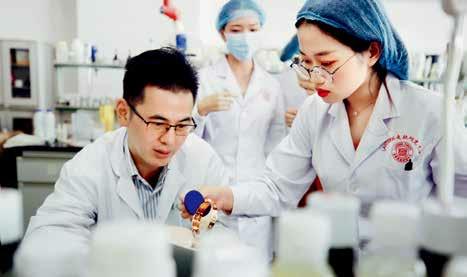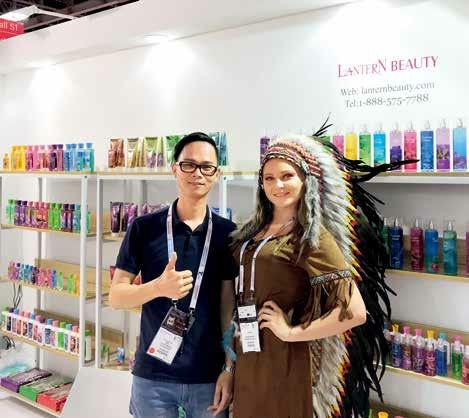A National Brand for the New Era
2020-08-10byZhiMo
by Zhi Mo

After several years working in the cosmetics industry, in 1993, 29-year-old Zhang Xuchang ventured south to Shenzhen, a coastal city in Guangdong Province known as the window of Chinas reform and opening up. There, he founded Shenzhen Lantern Science Co., Ltd. (hereinafter “Shenzhen Lantern Science”) and embarked on a mission to establish a national brand.
After more than 20 years, Shenzhen Lantern Science has evolved into a famous enterprise with seven branches around the world. The enterprise now boasts three large domestic production bases making multiple established cosmetic brands. Zhang continues to serve as the chairman of the cosmetics company.
“Researching, developing and producing cosmetics under our own brands is our core mission,”declares Zhang.
Manufacturing Safe Products
Product safety is tremendously important for cosmetics manufacturers. Because of the high production standards adopted by Shenzhen Lantern Science, its products are highly sought by consumers. Zhang believes that his company has developed a solid tracing mechanism for its cosmetic products. “We keep samples of each batch of products,” he reveals.“During the three-year shelf life of a product, we keep monitoring the samples to make sure theyre still good. We immediately activate our recall procedure if we detect defective products.”

Today, Shenzhen Lantern Science holds three invention patents, six utility patents, 26 software copyrights, and nine design patents. Its project to make nanocapsules with extract from natural spirulina has been designated as a national high-tech project. This technology is expected to maximize the richness and efficacy of skincare ingredients. In 2019, the enterprise invited two professors from Fudan University and Shanghai University of Traditional Chinese Medicine respectively to serve as chief consultants. The same year, it also launched technical cooperation with Wuxi-based Jiangnan University to jointly build a skincare research center. The institution is expected to provide a solid foundation for the enterprises further technological innovation.
Shenzhen Lantern Science has also constructed three factories that meet GMPC (Guidelines for Good Manufacturing Practice of Cosmetic Products) standards. GMPC requires strict production processes for cosmetic products to ensure consumer health. Of the three factories, the 68,000-square-meter standard plant in Shenzhen employs solar energy technology and places equal importance on product production, energy conservation, and environmental protection.

Better Growth
The year 2011 was considered a turning point in the development of Shenzhen Lantern Science. That year, the enterprise transformed from a privately-held firm to a jointstock company which led to rapid development and a strident march toward large-scale and systematic operation. Zhang believes that Shenzhen Lantern Science becoming a joint-stock company resulted in a more standardized framework, faster development speed, and enhanced capability to withstand risk. He feels that the enterprise has achieved a better growth in recent years and that he has become more objective and mature as its chairman.
Also in 2011, the enterprise seized the opportunity to launch e-commerce development and began to transform its sales mode. It carried out online promotion of its brands and invested in online product sales and services. That year, the Lantern Skincare Center was established with an aim to provide high-quality and personalized skincare services. Such innovations enabled information about the company including descriptions of its new products and promotions to spread quickly and widely. Through feedback from clients, the enterprise can constantly improve its products and meet consumer demand in a timely manner.
Meanwhile, Shenzhen Lantern Science is exploring overseas markets. It has established cooperation with many retail chains in the United States and Canada and cultivated a solid base of loyal customers in the North American market. Zhang considers exporting a channel for learning advanced operational concepts from international markets and staying abreast of the latest trends in international quality products as much as an avenue for sales expansion. “We need to work hard to maintain a position in the fiercely competitive domestic market,” Zhang illustrates.“But we have to be brave enough to explore foreign markets and sharpen our competitive edge.”
Social Responsibility
During Chinas fight against the coronavirus early this year, Shenzhen Lantern Science donated antibacterial sanitizers to government departments, hospitals, police stations, schools, banks, and news agencies. It also produced 10,000 bottles of anti-fogging and antibacterial spray for goggles developed by Shenzhen-based Southern University of Science and Technology that was urgently needed to support the fight against the epidemic.
Antibacterial sanitizer is one of the enterprises high-tech products. Its ethanol concentration can kill more than 99.9 percent of viruses and bacteria on users hands.
After learning that governments at various levels and major hospitals in areas hit hard by the coronavirus were in dire need of alcohol-based hand sanitizers, Zhang directed his company to shift all its production to anti-epidemic and disinfection supplies. While most enterprises in China were still shut down, government regulators gave special permission to a team from Shenzhen Lantern Science to reopen to produce anti-epidemic supplies. With only a few employees coming back, the enterprise still produced an average of 100,000 bottles of hand sanitizers per day.“As a responsible enterprise, we wanted to do something to help our country and society in this difficult time,” declares Zhang. “Donating antibacterial hand sanitizers and guaranteeing delivery was absolutely within our abilities.”
The persisting shortage of anti-epidemic materials in many countries around the world has prompted international clients to contact Shenzhen Lantern Science to ask if they have antibacterial hand sanitizers available for export. The enterprise quickly contacted administrators in relevant countries. After obtaining recommendations from third-party certification authorities in related countries, it exported alcoholbased hand sanitizers by air to dozens of countries hit hard by the coronavirus including the United States, South Africa, Canada, and Italy.